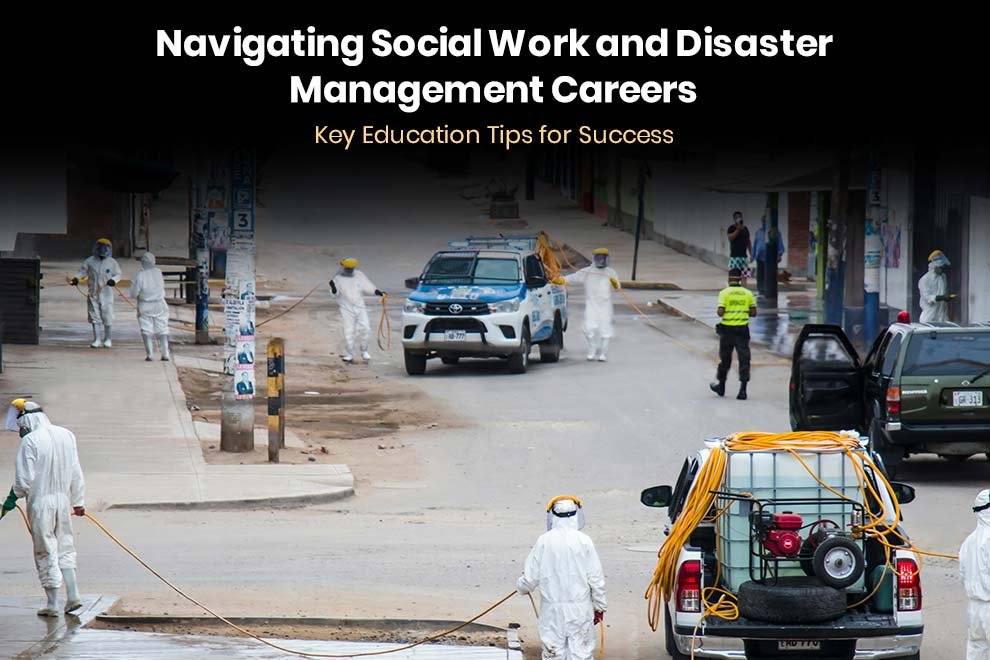The fields of social work and disaster management are integral in providing support and creating solutions in times of crisis. As both sectors grow in importance, professionals in these areas need a strong educational foundation to address complex challenges. There is an increasing demand for individuals who can blend the expertise of both fields, especially in situations that require immediate intervention and long-term recovery strategies. As the complexities of disasters, natural, man-made, and even health-related, continue to evolve, it’s essential to pursue an educational path that prepares you to navigate these challenges effectively.
Here’s how you can gain the skills needed to manage the emotional and practical demands of crisis management:
Understanding the Role of Social Workers in Disaster Management
In disaster situations, social workers play a crucial role in assisting individuals and communities affected by crises. They provide essential support, from offering emotional assistance to guiding families and communities through the process of recovery. Social workers are often the frontline responders in terms of providing psychological first aid, offering counseling, and helping communities rebuild both socially and emotionally. The role also extends to ensuring that vulnerable populations, such as children, the elderly, and people with disabilities, receive the appropriate services and care during and after a disaster. The skills that social workers bring to disaster management include crisis intervention, community engagement, and advocacy for survivors. These professionals help to stabilize communities and facilitate long-term recovery, focusing not just on immediate needs but on lasting well-being and resilience.
Combining Social Work and Disaster Management Education
To effectively tackle the challenges that arise in disaster scenarios, it’s becoming increasingly beneficial for individuals to pursue educational programs that combine social work and disaster management. These dual-focus programs provide a broader skillset, allowing professionals to respond to a crisis from both a psychological and logistical standpoint. Options like the MSW dual degree programs offer a structured approach to developing expertise in both disciplines. These programs typically feature an integrated curriculum, offering courses in disaster response, crisis communication, community organizing, and mental health support during emergencies. With this training, professionals are equipped to handle the complex demands of disaster management, ensuring they can support affected communities effectively and with compassion.
Essential Skills for Social Work and Disaster Management Careers
To thrive in both social work and disaster management, certain skills are non-negotiable. Among the most critical are strong communication abilities, empathy, and the capacity to stay calm under pressure. In disaster situations, the ability to communicate effectively can mean the difference between life and death. Social workers need to build trust with individuals who are often facing the most traumatic experiences of their lives. Additionally, being able to manage the emotional complexities of disaster survivors, while simultaneously organizing and leading recovery efforts, requires exceptional multitasking and problem-solving skills. Training in crisis intervention, cultural competency, and trauma-informed care is equally important, as these abilities ensure that professionals can respond to the unique needs of diverse populations in times of distress.
The Importance of Field Experience in Disaster Management
Field experience plays a pivotal role in preparing students and professionals for real-world challenges in social work and disaster management. While classroom instruction provides valuable theoretical knowledge, hands-on experience in the field is where the true learning occurs. Many programs incorporate internships and practical placements in disaster response scenarios, providing students with invaluable insights into the realities of crisis management. These opportunities not only enhance skills but also build networks within the industry, making it easier to secure positions after graduation. By working directly with communities affected by disasters, individuals gain a deep understanding of the complexities of recovery efforts and the ways in which social work and disaster management intersect.
Networking and Professional Development
Building a strong network is crucial for anyone pursuing a career in social work and disaster management. Networking allows professionals to connect with others in the field, learn from their experiences, and access new opportunities. Attending conferences, workshops, and seminars is a great way to expand one’s network and stay informed about the latest developments in both social work and disaster management. Additionally, joining relevant associations and online communities can provide access to resources and support from fellow professionals. Engaging in continuous learning, attending training sessions, and seeking mentorship opportunities are also effective ways to further develop skills and stay ahead in the field.
Job Market Outlook for Social Workers and Disaster Management Experts
The job market for professionals in social work and disaster management is expected to grow in the coming years, driven by the increasing frequency of natural disasters, the rise of global humanitarian efforts, and the evolving needs of communities. As governments and non-profits expand their disaster response teams, the demand for qualified social workers with disaster management expertise continues to rise. Social workers with dual expertise can expect to find opportunities in both the public and private sectors, making it a strong field for those looking to enter a fulfilling and impactful profession.
Work-Life Balance and Self-Care in Social Work and Disaster Management Careers
Working in social work and disaster management can be emotionally and physically taxing. It’s essential for professionals in these fields to prioritize self-care and maintain a healthy work-life balance. The demands of disaster response can be overwhelming, and without proper self-care, burnout is a real concern. It’s important to set boundaries, seek support from colleagues, and regularly engage in activities that promote mental and emotional well-being. Many professionals also benefit from participating in mindfulness practices, counseling, and stress management techniques, which can help mitigate the emotional toll of the work. Taking time for rest and recovery is crucial in order to continue providing high-quality care and support to communities in need.
Navigating a career in social work and disaster management is both challenging and rewarding. With the right education, such as pursuing dual-degree programs that combine expertise in both areas, individuals can position themselves for success in this dynamic and impactful field. By gaining the necessary skills, certifications, and field experience, professionals are better equipped to respond to crises and make a meaningful difference in the lives of those affected. Whether working on the ground during an emergency or supporting long-term recovery efforts, the opportunity to serve others in such a critical capacity is invaluable. As the demand for qualified professionals grows, those with a well-rounded education in social work and disaster management will continue to play a vital role in shaping resilient communities and providing essential care during times of need.
Also read: How do Social Security and Medicare Work Together?










